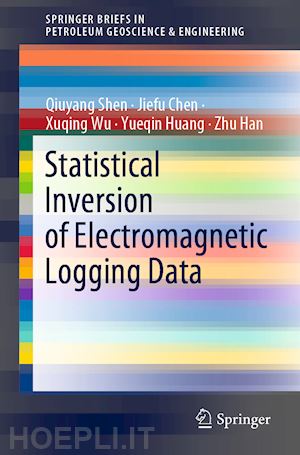
Questo prodotto usufruisce delle SPEDIZIONI GRATIS
selezionando l'opzione Corriere Veloce in fase di ordine.
Pagabile anche con Carta della cultura giovani e del merito, 18App Bonus Cultura e Carta del Docente
This book presents a comprehensive introduction to well logging and the inverse problem. It explores challenges such as conventional data processing methods’ inability to handle local minima issues, and presents the explanations in an easy-to-follow way.
The book describes statistical data interpretation by introducing the fundamentals behind the approach, as well as a range of sampling methods. In each chapter, a specific method is comprehensively introduced, together with representative examples.
The book begins with basic information on well logging and logging while drilling, as well as a definition of the inverse problem. It then moves on to discuss the fundamentals of statistical inverse methods, Bayesian inference, and a new sampling method that can be used to supplement it, the hybrid Monte Carlo method. The book then addresses a specific problem in the inversion of downhole logging data, and the interpretation of earth model complexity, before concluding with a meta-technique called the tempering method, which serves as a supplement to statistical sampling methods.Given its scope, the book offers a valuable reference guide for drilling engineers, well logging tool physicists, and geoscientists, as well as students in the areas of petroleum engineering and electrical engineering.
Jiefu Chen received his Ph.D. degree in electrical engineering from Duke University in 2010. He was a Staff Scientist with Advantage R&D Center, Weatherford International, from March 2011 to August 2015. Since then, he has been with University of Houston, where he is currently an Assistant Professor of Electrical and Computer Engineering. He has published more than 100 technical journal and conference papers on computational electromagnetics, subsurface wireless communication, and well logging.
Xuqing Wuis an Assistant Professor of Computer Information Systems in the College of Technology at the University of Houston. His research interests include machine learning, inverse problems, subsurface sensing, and computer vision. Prior to joining the University of Houston in 2015, he was a data scientist and modeling engineer at Schlumberger. He received his Ph.D. degree in Computer Science from the University of Houston.
Yueqin Huang received his Ph.D. degree in electrical engineering from Xiamen University, China, in 2011. She was an Assistant Professor with Xiamen University, Xiamen, China, from August 2011 to August 2012. Currently she is the Chief Scientist of Cyentech Consulting LLC, Cypress, TX. She has published more than 30 technical journal and conference papers on subsurface sensing and communication.
Zhu Han received his B.Sc in electronic engineering from Tsinghua University, in 1997, and his M.S. and Ph.D. degrees in electrical and computer engineering from the University of Maryland, College Park, in 1999 and 2003, respectively. From 2000 to 2008, he worked in industry and academic positions, including as an assistant professor at Boise State University, Idaho. Currently, he is a John and Rebecca Moores Professor in the Electrical and Computer Engineering Department as well as in the Computer Science Department at the University of Houston. His research interests include wireless resource allocation and management, wireless communications and networking, game theory, big data analysis, security, and smart grid. Dr Han has received several awards and best paper prizes including an NSF Career Award in 2010, the Fred W. Ellersick Prize of the IEEE Communication Society in 2011, and the IEEE Leonard G. Abraham Prize in the field of Communications Systems in 2016. Dr Han is IEEE fellow since 2014, AAAS fellow since 2019 and ACM distinguished member since 2019.











Il sito utilizza cookie ed altri strumenti di tracciamento che raccolgono informazioni dal dispositivo dell’utente. Oltre ai cookie tecnici ed analitici aggregati, strettamente necessari per il funzionamento di questo sito web, previo consenso dell’utente possono essere installati cookie di profilazione e marketing e cookie dei social media. Cliccando su “Accetto tutti i cookie” saranno attivate tutte le categorie di cookie. Per accettare solo deterninate categorie di cookie, cliccare invece su “Impostazioni cookie”. Chiudendo il banner o continuando a navigare saranno installati solo cookie tecnici. Per maggiori dettagli, consultare la Cookie Policy.